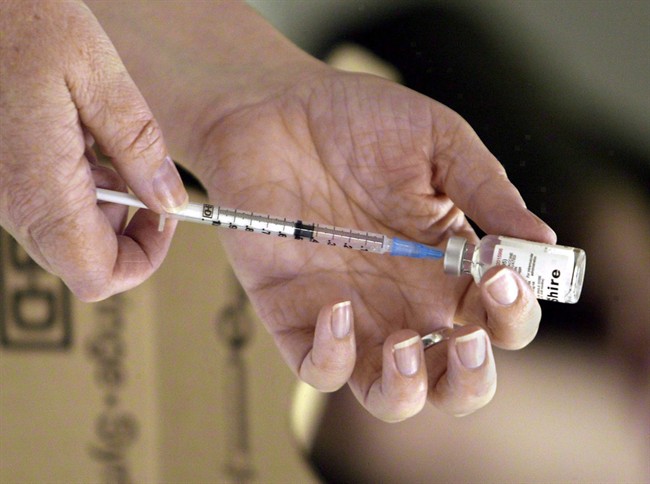It seems that in every election that has taken place during my lifetime, voters have tended to rate health care as a top issue, and according to Darrell Bricker of Ipsos, this election is no different.

When talking about health care, party leaders have tended to focus on things like prescription drug prices, home care or access to a family doctor — all of which are incredibly important issues that deserve a robust policy discussion. Yet I can’t help but think about one issue that gets almost no attention from either the political parties or their leaders: immunization rates.
It’s not the sexiest health-care issue, but with flu season right around the corner and diseases that were once thought to be eradicated making a comeback, Canadians should be talking about vaccines.
READ MORE: Here’s what to expect from the 2019-20 flu season
Every year, people die from the flu. In Canada, it kills roughly 3,500 people each year, making it one of the top 10 leading causes of death in this country. And yet, according to a recent poll, nearly 40 per cent of Canadians say they won’t get the flu vaccine this year.
While it’s true the influenza vaccine does not inoculate one against any and all variations of the virus, it does protect against what is believed to be the most common strains for the upcoming flu season. It’s not exactly complicated, and yet every year, people will forgo their flu shot, which is free in Ontario, for no reason other than not “believing” that it makes a difference.
The internet is rife with misinformation when it comes to vaccines. Add in obtuse and vapid celebrities or “wellness gurus” with large social media followings who further propagate the misinformation, and it becomes quite clear how blatant misinformation persists.

Get daily National news
WATCH (April 2, 2019): How ‘vaccine hesitancy’ became a threat to public health

Getting the vaccine means that one is much less likely to get the flu, and even if one does get it, the symptoms are a lot less severe, lowering the risk of complications and speeding up recovery time. For most people, underlying motivations for getting the vaccine are about themselves. After all, most normal humans hate being sick.
But getting vaccinated isn’t just about oneself. It’s about those in your direct and even peripheral social circles. Chances are someone you know is considered at risk for complications stemming from influenza. Start thinking of the people in your life with whom you’re in contact regularly or even semi-regularly. Are any of them older than 65 or younger than five? Pregnant? Maybe someone has asthma, diabetes or anemia? All of these conditions put someone at a greater risk of flu-related complications, including hospitalizations and death.
Although, I suppose people cannot be expected to get vaccinated for the common flu when they are literally refusing to vaccinate against diseases that were once upon a time thought to be eliminated from the western world, such as measles.
READ MORE: The U.S. could lose its measles-elimination status soon and here’s why that matters
The United States currently risks losing its measles elimination status, while the United Kingdom has already lost its own. It’s not hard to foresee a future in which Canada loses its measles elimination status if we do not remain vigilant, and that is incredibly worrying. Before the widespread adoption of the measles vaccine, the disease used to kill approximately 2.6 million people a year.
Measles is incredibly contagious. A person with measles can walk into a room and cough or sneeze, and the virus will live in the airspace waiting to infect the next unprotected person for up to two hours. According to the U.S. Centers for Disease Control and Prevention, “measles is so contagious that if one person has it, up to 90 per cent of the people close to that person who are not immune will also become infected.”
Accordingly, measles requires roughly 95 per cent of the population to be vaccinated in order for people to be protected, a concept known as herd immunity.
READ MORE: 9 in 10 Canadians say vaccines should be mandatory for school, says Ipsos poll (April 3, 2019)
The good news is that there are currently no active cases of measles in Canada. The not-so-good news is that there were 111 cases in 2019, spanning multiple provinces. And the bad news is that while vaccination rates remain high in Canada, they are not reaching the levels needed to keep the general population safe. In fact, in certain places like Manitoba, only 75 per cent of kids receive both doses of the MMR vaccine by age seven.
Canadians are weirdly proud of our health-care system. In a recent survey, roughly 75 per cent of respondents cited it as a source of national pride.
And yet something as simple as keeping up with herd immunity is slipping from our grasp — that’s nothing to be proud of, and politicians should be talking about that.
Supriya Dwivedi is co-host of The Morning Show on Global News Radio 640 Toronto and a columnist for Global News.









Comments